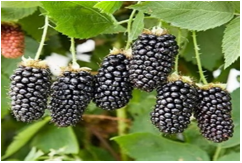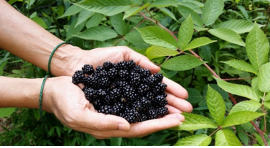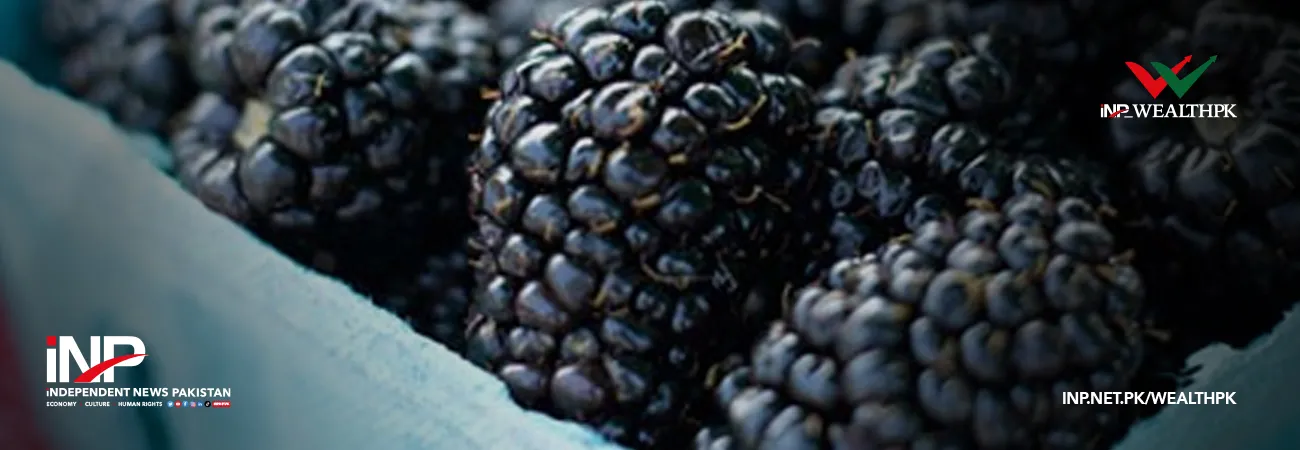INP-WealthPk
Azeem Ahmed Khan
Once a rare sight on Pakistan’s agricultural landscape, blackberries are now gaining ground as the country’s most promising high-value fruit. Hardy, resilient, and rich in health benefits, the blackberry is increasingly seen by experts and farmers alike as a game-changer for boosting rural incomes and sustainable agriculture.

“Blackberry is Pakistan’s most profitable fruit today,” said Muhammad Aqeel Feroze, Senior Scientist at the Barani Agricultural Research Institute (BARI), Chakwal, during an interview with WealthPK. “It is rich in nutrition and taste, starts commercial production just one year after planting, and yields exceptional returns per acre.”
With its low input costs, fast returns, and endless value-added possibilities, blackberry is no longer just a fruit. It is a business opportunity in Pakistan, Aqeel said. “I advise every progressive farmer to try it, especially those near cities who can utilise the online market.”
The cultivated blackberry variety introduced by BARI is far superior to the wild varieties found in northern areas like Gilgit, Kashmir, and Abbottabad, which are smaller and lack commercial value, he said.
Originally tested in the Pothwar region, BARI is now distributing blackberry plants nationwide, Aqeel said, adding that these are nursery-hardened plants before being sold to farmers.
“This is a very hardy plant,” Aqeel noted. “It thrives in both extreme heat -- up to 50 degrees centigrade in southern plains -- and in freezing northern temperatures. Its adaptability makes it suitable for cultivation across Pakistan, from Punjab to Balochistan and Khyber Pakhtunkhwa to Sindh,” he said.
The fruit, which begins flowering in February and is ready for harvest by the first week of May, is considered ideal for farmers seeking quick returns, he said. While most fruit crops in Pakistan take three to five years to start producing commercially, blackberries bear fruit in just one year. A single acre can host 725 plants, producing 5,000 to 6,000 kilogrammes of fruit annually.

At a market price of Rs1,000 to Rs3,000 per kilogramme the economic case is strong, he said. Even a small-scale farmer cultivating an acre could potentially gross Rs1 million to Rs2 million per year, he added.
It is suitable for all soil types except saline or waterlogged areas, the senior scientist said. Unlike many other fruits that require regular chemical spraying, blackberries can be cultivated almost entirely organically. Farmers are encouraged to use cow dung manure in December to enrich soil health and enhance fruit quality, he added.
For landowners near major urban centres like Lahore, Islamabad, and Karachi, blackberry offers a unique opportunity for direct-to-consumer sales through social media marketing, self-picking farms, and local delivery, Aqeel pointed out.
“In Saudi Arabia, a 170-gram box sells for 20-30 riyals,” Aqeel noted. With smart marketing, Pakistani farmers can tap into premium markets both local and abroad, he added.
Blackberry’s potential extends far beyond fresh consumption. “Due to its short shelf life, farmers can turn surplus fruit into jam, pulp, squash, juice, and canned syrup, all of which fetch higher prices.”
The jam is especially popular internationally, but it is still missing at Pakistani stores, so there is a huge opportunity here, he said.
Even the leaves of the blackberry plant have commercial value. “Dried in shade and packed as blackberry tea, they are sold as a premium antioxidant, anti-aging, and immunity-boosting product.”
Despite having small thorns, the fruit is easy to pick with gloves. It can be packed in 250g to 500g boxes, but careful handling is essential due to its delicate nature. “If pressed, the fruit may go bad.”
Due to its compact size, plants grow up to three feet tall, so blackberry cultivation is also catching on in urban settings. "It can be grown in pots or on rooftops, even four to five plants are enough to feed a small family,” he said.
Credit: INP-WealthPk









